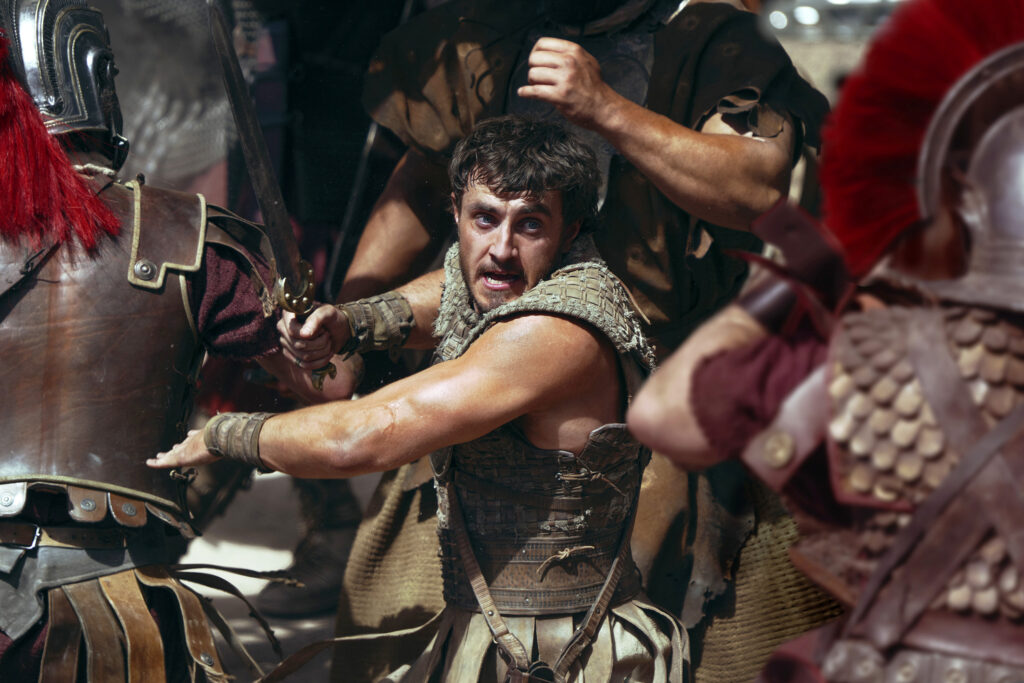‘Gladiator II,’ Behind Paul Mescal and Denzel Washington, Is a Spectacle That Satisfies
Blood and circuses galore as blockbuster blurs lines between politics, entertainment, and bloodsport.

“Gladiator II” is a spectacle, but is it any good? That’s the question the two-and-a-half-hour extravaganza poses to even the most ardent fan of violence and Virgil. The first installment, which won at the box office and the Oscars, could credibly claim Julius Caesar’s motto — veni, vidi, vici, “I came, I saw, I conquered.” Now, its octogenarian director, Ridley Scott — few Caesars lived so long — is back in the Colosseum, hoping for a second upturned thumb.
A dictator or a director is only as good as the army he leads, and the host that Mr. Scott assembles is a strong one. They clearly enjoy marching behind his standard. Following in Russell Crowe’s sandals as gladiator is an Irish actor, Paul Mescal, as Lucius, a captive of Rome’s war who battles his way to the summit. Denzel Washington is a superb Macrinus, a corrupted Horatio Alger of antiquity. He is camp and compelling, a star giving it his all.
The details of the plot are hardly set with Ciceronian care. Lucius lives in a place called Namidia, rendered as a plucky and multicultural free city that Rome brings to heel in the film’s scintillating opening scene. The underdogs fail to carry the day. Lucius’s wife is killed, and he is taken captive. The Roman general, Marcus Acacius (Pedro Pascal), is tired of winning, and the body count that is victory’s cost. Conquest contorts his conscience.
Rome is ruled by a deranged set of twin-emperors, Caracalla (Fred Hechinger) and Geta (Joseph Quinn). Funhouse images of the mythical founders of the Eternal City, Romulus and Remus, they demand that Acacius turn his sights on “Persia and India.” Acacia and his wife Lucilla (Connie Nielsen) are more interested in regime change at home. *Lucilla’s father is that Marcus Aurelius, and the Stoic would be displeased by how far Rome has fallen.
Lucius plumbs those depths — literally. Thrown into a pit, he traces the gladiator’s blood-stained path. His first contest is with agitated computer-generated baboons, and he proves to be just as feral in his rage and adept with his incisors as the beasts. Human combatants come next, and here too Lucius manages to be both pitiless and detached — he kills with the dispatch of a man already dead inside. The Colosseum is his comfort zone.

When Titus opened the Colosseum in year 80 of the common era — he was flush with riches following his conquest of Jerusalem and destruction of the Second Temple, commemorated on an arch nearby — he staged naumachiae, or re-enactments of naval battles, complete with ships and enough water to fill a crater. Mr. Scott nods to those extravaganzas with a scene that features hungry sharks, blood in the water, and splintered wood and limbs.
Soon enough the action in the arena and the political intrigue outside of it converge. Lucius, like many heroes of old, turns out to have royal antecedents — his blood runs not only red, but also purple. The violence of the gladiators spills over into the stands, even reaching the Imperial Box. Lucius and Macrinus both relish this widening circle of combat, though for different reasons. Macrinus wants the throne. Lucius wants revenge.
At least initially. “Gladiator II” aims to be about not only the shredding of bodies but also the honing of minds. The maxims of Marcus Aurelius surface like some half-remembered patrimony, and senators and slaves alike recall the “dream of Rome,” which is set against the emperors who make Caligula resemble a paragon of wise leadership. The truth, though, is that once the Roman Republic fell, it was never resurrected. Too many had too much to lose.
For all that, the script is hardly drawn from the scribblings of Seneca. Like the rulers of old, Mr. Scott gives what the throngs demand. Or most of it. There is startlingly little romance in the film and hardly any sex. “Gladiator II” is set almost entirely in public spaces, and the audience at the cinema is often mirrored by the spectators onscreen. It is a tale as old as time, but also one set for a moment when our politics ask: “Are you not entertained?”
————————
*Correction: Lucilla’s father is Marcus Aurelius. Her name was misstated in an earlier version.

